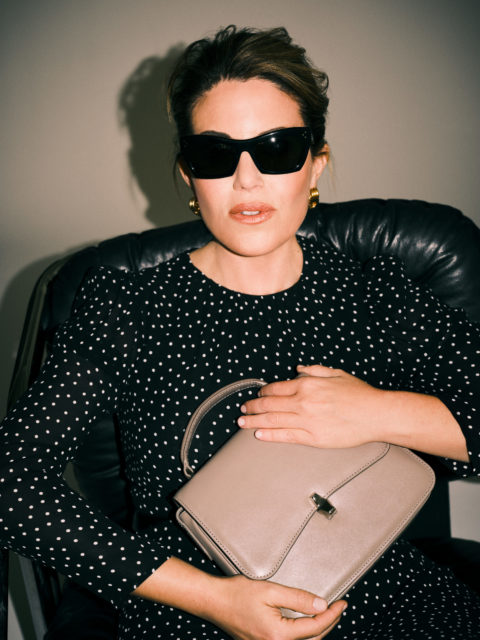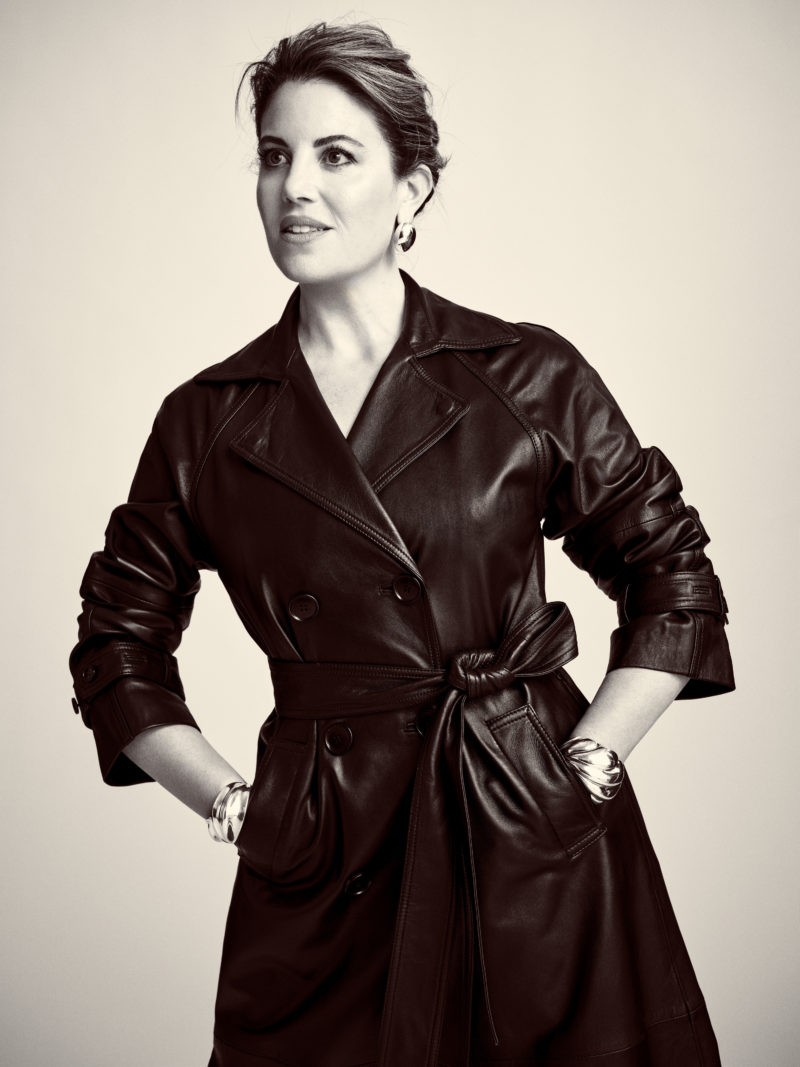Monica Lewinsky Reformation Campaign Uses Fashion for Good
It’s more than *just* clever marketing.
Reformation, the brand you love for knee-high boots and saucy dresses, is encouraging people to vote with the help of a famous face. Earlier this week, the sustainable fashion brand released their new “You’ve Got the Power” campaign starring the one and only Monica Lewinsky in a modern take on power dressing.
For those who don’t know her, Lewinsky first entered the public eye in 1995 when it was revealed she had been in a relationship with then-president Bill Clinton. Clinton was impeached and Lewinsky, a young White House intern at the time, was dragged by the media. Decades later, we understand that Clinton and Lewinsky didn’t have a scandalous affair, but rather Lewinsky fell victim to a complete misuse of Clinton’s power. Thankfully, changing attitudes towards mistreated women of the ’90s and early 2000s (think Britney Spears, Lindsay Lohan, Pamela Anderson and Paris Hilton) have people rethinking their treatment of Lewinsky.
And now she’s fronting a major fashion campaign, joining forces with vote.org and Reformation to encourage people to vote in the upcoming U.S. presidential election. It’s genius marketing, but we shouldn’t be *that* surprised — Reformation and Lewinsky’s partnership is just the latest example of fashion being intertwined with politics. And it makes sense it would be debuting now.
To be clear, fashion has played a role in politics since the early 20th century when suffragettes, members of an activist group pushing for women to have the right to vote, used clothing as a way to help further their cause in a surprising way — leaning into conventional dress as a means of “resistance through reversal.” Essentially, this meant trying to blend in while they did their important work. They also chose a specific colour scheme, having members wear purple for loyalty and dignity, white for purity and green for hope, per The Guardian.
In more recent years, fashion and pop culture have intersected in varying ways to address political moments, especially when it comes to voting. In 2004 and 2008, while George W. Bush was president, a war in Iraq was raging and the U.S. was heading into the a recession, Citizen Change, a political advocacy project founded by P. Diddy, Mary J. Blige, Mariah Carey and 50 Cent launched the “Vote or Die” campaign. Starring celebrities like Paris Hilton donning shirts emblazoned with Vote or Die, ads ran on popular channels of the time like MTV and BET to encourage young folks to vote.
And in 2020, after four years of Donald Trump, famous faces like Lizzo, Prabal Gurung, Sophia Bush, and Mandy Moore took to social media with the #RunwayToThePolls challenge, sharing videos of themselves strutting in voting ’fits to mail in their absentee ballots. The videos, fun in nature (and A+ for scoping out celeb style), also served a purpose, making voting seem like not only something that’s essential and accessible, but can also be fun to do. (You can dress up! You can buy fun merch! You can share the experience with friends!)
It’s no surprise that these two initiatives launched when they did, because 2004-2008 and 2020 were inarguably scary times in the world, and in the United States specifically where citizens are faced with a rise in acts of hatred and racism and the deterioration of human rights. There was a lot going on, and that can feel daunting to people who want circumstances to change but don’t necessarily know how, or don’t think their voices have a place in the world of politics.
A recent poll from Harvard University’s Institute of Politics found that young Americans between 18 and 29 years old are less likely to vote in 2024 than they did in 2023. With young people feeling less-inclined to vote due to disenchantment with the political system, it’s more essential than ever to communicate the necessity to vote via the avenues people know and respond to — through fashion and celebrities.
Which brings us to the here and now. When you consider the history of Vote or Die and #RunwayToThePolls, it’s no surprise that Reformation would enter the political conversation and link up with Lewinsky — an identifiable and almost suffragette-like figure — right now. Despite the writer and activist having a much-deserved renaissance over the past several years, the timing of this collab matters, because the past several years have been just plain terrible.

Between the overturning of Roe v. Wade in 2022, the enforcement of laws that directly target and jeopardize the safety of transgender youth, and the country’s ongoing support of Israel in the Gaza conflict, there’s a lot at stake when it comes to who takes political office. And for new voters, seeing recognizable faces and brands they love encouraging them to vote might just be the push they need to register.
And it serves as a reminder to us here in Canada, too. While we may often think that Canada has it all figured out compared to our souther neighbours, we don’t. Our politicians (some far right politicians excluded) may not be as vocal and forthright as Trump in their misogyny, but that doesn’t mean that they’re any better or that Canadians aren’t facing similarly restrictive laws. Despite access to abortion being legal in Canada, access to reproductive health services is an entirely different story, and can be extremely difficult for those in rural and Indigenous communities.
A 2013 study found that 18 per cent of women in Canada travelled more than 100 kilometres to access abortion care, with Indigenous women being three times more likely to travel this distance. In some provinces, like New Brunswick, local clinics no longer operate due to a lack of funding from the government, meaning people have to trek to one of the few hospitals in the province that offer the procedure.

Outside of access to reproductive health, the recent implementation of Bill C-18 (the Online News Act), which led to the banning of sharing Canadian news on Meta platforms, is also a threat to democracy and something Canadians should be concerned about.
So, what does it all mean? Canada isn’t entirely in the clear and, similar to our American friends, we also need to think long and hard about just who — and what — we’re putting our votes behind.
Now, more than ever, it’s essential that people make their voices heard. And if it takes a campaign from a sustainable fashion brand to do it, then count us in. Plus, Lewinsky looks frickin’ great, and that’s worth celebrating, too.







